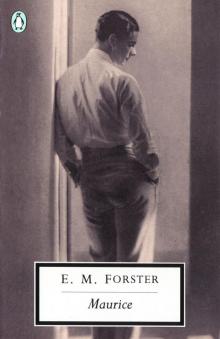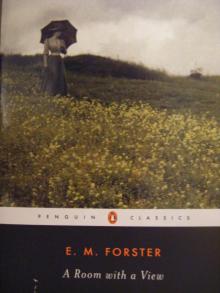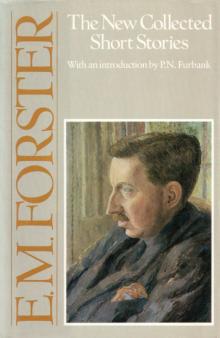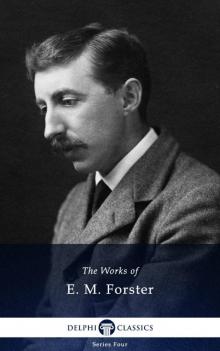- Home
- E. M. Forster
Works of E M Forster Page 35
Works of E M Forster Read online
Page 35
The day before his departure Rickie sat with him some time, and tried to talk in a way that was not pedantic. In his own sorrow, which he could share with no one, least of all with his wife, he was still alive to the sorrows of others. He still fought against apathy, though he was losing the battle.
“Don’t lose heart,” he told him. “The world isn’t all going to be like this. There are temptations and trials, of course, but nothing at all of the kind you have had here.”
“But school is the world in miniature, is it not, sir?” asked the boy, hoping to please one master by echoing what had been told him by another. He was always on the lookout for sympathy — : it was one of the things that had contributed to his downfall.
“I never noticed that myself. I was unhappy at school, and in the world people can be very happy.”
Varden sighed and rolled about his eyes. “Are the fellows sorry for what they did to me?” he asked in an affected voice. “I am sure I forgive them from the bottom of my heart. We ought to forgive our enemies, oughtn’t we, sir?”
“But they aren’t your enemies. If you meet in five years’ time you may find each other splendid fellows.”
The boy would not admit this. He had been reading some revivalistic literature. “We ought to forgive our enemies,” he repeated; “and however wicked they are, we ought not to wish them evil. When I was ill, and death seemed nearest, I had many kind letters on this subject.”
Rickie knew about these “many kind letters.” Varden had induced the silly nurse to write to people — people of all sorts, people that he scarcely knew or did not know at all — detailing his misfortune, and asking for spiritual aid and sympathy.
“I am sorry for them,” he pursued. “I would not like to be like them.”
Rickie sighed. He saw that a year at Dunwood House had produced a sanctimonious prig. “Don’t think about them, Varden. Think about anything beautiful — say, music. You like music. Be happy. It’s your duty. You can’t be good until you’ve had a little happiness. Then perhaps you will think less about forgiving people and more about loving them.”
“I love them already, sir.” And Rickie, in desperation, asked if he might look at the many kind letters.
Permission was gladly given. A neat bundle was produced, and for about twenty minutes the master perused it, while the invalid kept watch on his face. Rooks cawed out in the playing-fields, and close under the window there was the sound of delightful, good-tempered laughter. A boy is no devil, whatever boys may be. The letters were chilly productions, somewhat clerical in tone, by whomsoever written. Varden, because he was ill at the time, had been taken seriously. The writers declared that his illness was fulfilling some mysterious purpose: suffering engendered spiritual growth: he was showing signs of this already. They consented to pray for him, some majestically, others shyly. But they all consented with one exception, who worded his refusal as follows: —
Dear A.C. Varden, —
I ought to say that I never remember seeing you. I am sorry that you are ill, and hope you are wrong about it. Why did you not write before, for I could have helped you then? When they pulled your ear, you ought to have gone like this (here was a rough sketch). I could not undertake praying, but would think of you instead, if that would do. I am twenty-two in April, built rather heavy, ordinary broad face, with eyes, etc. I write all this because you have mixed me with some one else, for I am not married, and do not want to be. I cannot think of you always, but will promise a quarter of an hour daily (say 7.00-7.15 A.M.), and might come to see you when you are better — that is, if you are a kid, and you read like one. I have been otter-hunting —
Yours sincerely,
Stephen Wonham
XXIII
Riekie went straight from Varden to his wife, who lay on the sofa in her bedroom. There was now a wide gulf between them. She, like the world she had created for him, was unreal.
“Agnes, darling,” he began, stroking her hand, “such an awkward little thing has happened.”
“What is it, dear? Just wait till I’ve added up this hook.”
She had got over the tragedy: she got over everything.
When she was at leisure he told her. Hitherto they had seldom mentioned Stephen. He was classed among the unprofitable dead.
She was more sympathetic than he expected. “Dear Rickie,” she murmured with averted eyes. “How tiresome for you.”
“I wish that Varden had stopped with Mrs. Orr.”
“Well, he leaves us for good tomorrow.”
“Yes, yes. And I made him answer the letter and apologize. They had never met. It was some confusion with a man in the Church Army, living at a place called Codford. I asked the nurse. It is all explained.”
“There the matter ends.”
“I suppose so — if matters ever end.”
“If, by ill-luck, the person does call. I will just see him and say that the boy has gone.”
“You, or I. I have got over all nonsense by this time. He’s absolutely nothing to me now.” He took up the tradesman’s book and played with it idly. On its crimson cover was stamped a grotesque sheep. How stale and stupid their life had become!
“Don’t talk like that, though,” she said uneasily. “Think how disastrous it would be if you made a slip in speaking to him.”
“Would it? It would have been disastrous once. But I expect, as a matter of fact, that Aunt Emily has made the slip already.”
His wife was displeased. “You need not talk in that cynical way. I credit Aunt Emily with better feeling. When I was there she did mention the matter, but only once. She, and I, and all who have any sense of decency, know better than to make slips, or to think of making them.”
Agnes kept up what she called “the family connection.” She had been once alone to Cadover, and also corresponded with Mrs. Failing. She had never told Rickie anything about her visit nor had he ever asked her. But, from this moment, the whole subject was reopened.
“Most certainly he knows nothing,” she continued. “Why, he does not even realize that Varden lives in our house! We are perfectly safe — unless Aunt Emily were to die. Perhaps then — but we are perfectly safe for the present.”
“When she did mention the matter, what did she say?”
“We had a long talk,” said Agnes quietly. “She told me nothing new — nothing new about the past, I mean. But we had a long talk about the present. I think” and her voice grew displeased again— “that you have been both wrong and foolish in refusing to make up your quarrel with Aunt Emily.”
“Wrong and wise, I should say.”
“It isn’t to be expected that she — so much older and so sensitive — can make the first step. But I know she’d he glad to see you.”
“As far as I can remember that final scene in the garden, I accused her of ‘forgetting what other people were like.’ She’ll never pardon me for saying that.”
Agnes was silent. To her the phrase was meaningless. Yet Rickie was correct: Mrs. Failing had resented it more than anything.
“At all events,” she suggested, “you might go and see her.”
“No, dear. Thank you, no.”
“She is, after all— “ She was going to say “your father’s sister,” but the expression was scarcely a happy one, and she turned it into, “She is, after all, growing old and lonely.”
“So are we all!” he cried, with a lapse of tone that was now characteristic in him.
“She oughtn’t to be so isolated from her proper relatives.”
There was a moment’s silence. Still playing with the book, he remarked, “You forget, she’s got her favourite nephew.”
A bright red flush spread over her cheeks. “What is the matter with you this afternoon?” she asked. “I should think you’d better go for a walk.”
“Before I go, tell me what is the matter with you.” He also flushed. “Why do you want me to make it up with my aunt?”
“Because it’s right and proper.”
> “So? Or because she is old?”
“I don’t understand,” she retorted. But her eyes dropped. His sudden suspicion was true: she was legacy hunting.
“Agnes, dear Agnes,” he began with passing tenderness, “how can you think of such things? You behave like a poor person. We don’t want any money from Aunt Emily, or from any one else. It isn’t virtue that makes me say it: we are not tempted in that way: we have as much as we want already.”
“For the present,” she answered, still looking aside.
“There isn’t any future,” he cried in a gust of despair.
“Rickie, what do you mean?”
What did he mean? He meant that the relations between them were fixed — that there would never be an influx of interest, nor even of passion. To the end of life they would go on beating time, and this was enough for her. She was content with the daily round, the common task, performed indifferently. But he had dreamt of another helpmate, and of other things.
“We don’t want money — why, we don’t even spend any on travelling. I’ve invested all my salary and more. As far as human foresight goes, we shall never want money.” And his thoughts went out to the tiny grave. “You spoke of ‘right and proper,’ but the right and proper thing for my aunt to do is to leave every penny she’s got to Stephen.”
Her lip quivered, and for one moment he thought that she was going to cry. “What am I to do with you?” she said. “You talk like a person in poetry.”
“I’ll put it in prose. He’s lived with her for twenty years, and he ought to be paid for it.”
Poor Agnes! Indeed, what was she to do? The first moment she set foot in Cadover she had thought, “Oh, here is money. We must try and get it.” Being a lady, she never mentioned the thought to her husband, but she concluded that it would occur to him too. And now, though it had occurred to him at last, he would not even write his aunt a little note.
He was to try her yet further. While they argued this point he flashed out with, “I ought to have told him that day when he called up to our room. There’s where I went wrong first.”
“Rickie!”
“In those days I was sentimental. I minded. For two pins I’d write to him this afternoon. Why shouldn’t he know he’s my brother? What’s all this ridiculous mystery?”
She became incoherent.
“But WHY not? A reason why he shouldn’t know.”
“A reason why he SHOULD know,” she retorted. “I never heard such rubbish! Give me a reason why he should know.”
“Because the lie we acted has ruined our lives.”
She looked in bewilderment at the well-appointed room.
“It’s been like a poison we won’t acknowledge. How many times have you thought of my brother? I’ve thought of him every day — not in love; don’t misunderstand; only as a medicine I shirked. Down in what they call the subconscious self he has been hurting me.” His voice broke. “Oh, my darling, we acted a lie then, and this letter reminds us of it and gives us one more chance. I have to say ‘we’ lied. I should be lying again if I took quite all the blame. Let us ask God’s forgiveness together. Then let us write, as coldly as you please, to Stephen, and tell him he is my father’s son.”
Her reply need not be quoted. It was the last time he attempted intimacy. And the remainder of their conversation, though long and stormy, is also best forgotten.
Thus the first effect of Varden’s letter was to make them quarrel. They had not openly disagreed before. In the evening he kissed her and said, “How absurd I was to get angry about things that happened last year. I will certainly not write to the person.” She returned the kiss. But he knew that they had destroyed the habit of reverence, and would quarrel again. On his rounds he looked in at Varden and asked nonchalantly for the letter. He carried it off to his room. It was unwise of him, for his nerves were already unstrung, and the man he had tried to bury was stirring ominously. In the silence he examined the handwriting till he felt that a living creature was with him, whereas he, because his child had died, was dead. He perceived more clearly the cruelty of Nature, to whom our refinement and piety are but as bubbles, hurrying downwards on the turbid waters. They break, and the stream continues. His father, as a final insult, had brought into the world a man unlike all the rest of them, a man dowered with coarse kindliness and rustic strength, a kind of cynical ploughboy, against whom their own misery and weakness might stand more vividly relieved. “Born an Elliot — born a gentleman.” So the vile phrase ran. But here was an Elliot whose badness was not even gentlemanly. For that Stephen was bad inherently he never doubted for a moment and he would have children: he, not Rickie, would contribute to the stream; he, through his remote posterity, might mingled with the unknown sea.
Thus musing he lay down to sleep, feeling diseased in body and soul. It was no wonder that the night was the most terrible he had ever known. He revisited Cambridge, and his name was a grey ghost over the door. Then there recurred the voice of a gentle shadowy woman, Mrs. Aberdeen, “It doesn’t seem hardly right.” Those had been her words, her only complaint against the mysteries of change and death. She bowed her head and laboured to make her “gentlemen” comfortable. She was labouring still. As he lay in bed he asked God to grant him her wisdom; that he might keep sorrow within due bounds; that he might abstain from extreme hatred and envy of Stephen. It was seldom that he prayed so definitely, or ventured to obtrude his private wishes. Religion was to him a service, a mystic communion with good; not a means of getting what he wanted on the earth. But tonight, through suffering, he was humbled, and became like Mrs. Aberdeen. Hour after hour he awaited sleep and tried to endure the faces that frothed in the gloom — his aunt’s, his father’s, and, worst of all, the triumphant face of his brother. Once he struck at it, and awoke, having hurt his hand on the wall. Then he prayed hysterically for pardon and rest.
Yet again did he awake, and from a more mysterious dream. He heard his mother crying. She was crying quite distinctly in the darkened room. He whispered, “Never mind, my darling, never mind,” and a voice echoed, “Never mind — come away — let them die out — let them die out.” He lit a candle, and the room was empty. Then, hurrying to the window, he saw above mean houses the frosty glories of Orion.
Henceforward he deteriorates. Let those who censure him suggest what he should do. He has lost the work that he loved, his friends, and his child. He remained conscientious and decent, but the spiritual part of him proceeded towards ruin.
XXIV
The coming months, though full of degradation and anxiety, were to bring him nothing so terrible as that night. It was the crisis of this agony. He was an outcast and a failure. But he was not again forced to contemplate these facts so clearly. Varden left in the morning, carrying the fatal letter with him. The whole house was relieved. The good angel was with the boys again, or else (as Herbert preferred to think) they had learnt a lesson, and were more humane in consequence. At all events, the disastrous term concluded quietly.
In the Christmas holidays the two masters made an abortive attempt to visit Italy, and at Easter there was talk of a cruise in the Aegean. Herbert actually went, and enjoyed Athens and Delphi. The Elliots paid a few visits together in England. They returned to Sawston about ten days before school opened, to find that Widdrington was again stopping with the Jacksons. Intercourse was painful, for the two families were scarcely on speaking terms; nor did the triumphant scaffoldings of the new boarding-house make things easier. (The party of progress had carried the day.) Widdrington was by nature touchy, but on this occasion he refused to take offence, and often dropped in to see them. His manner was friendly but critical. They agreed he was a nuisance. Then Agnes left, very abruptly, to see Mrs. Failing, and while she was away Rickie had a little stealthy intercourse.
Her absence, convenient as it was, puzzled him. Mrs. Silt, half goose, half stormy-petrel, had recently paid a flying visit to Cadover, and thence had flown, without an invitation, to Sawston. Generally she was not
a welcome guest. On this occasion Agnes had welcomed her, and — so Rickie thought — had made her promise not to tell him something that she knew. The ladies had talked mysteriously. “Mr. Silt would be one with you there,” said Mrs. Silt. Could there be any connection between the two visits?
Agnes’s letters told him nothing: they never did. She was too clumsy or too cautious to express herself on paper. A drive to Stonehenge; an anthem in the Cathedral; Aunt Emily’s love. And when he met her at Waterloo he learnt nothing (if there was anything to learn) from her face.
“How did you enjoy yourself?”
“Thoroughly.”
“Were you and she alone?”
“Sometimes. Sometimes other people.”
“Will Uncle Tony’s Essays be published?”
Here she was more communicative. The book was at last in proof. Aunt Emily had written a charming introduction; but she was so idle, she never finished things off.
They got into an omnibus for the Army and Navy Stores: she wanted to do some shopping before going down to Sawston.
“Did you read any of the Essays?”
“Every one. Delightful. Couldn’t put them down. Now and then he spoilt them by statistics — but you should read his descriptions of Nature. He agrees with you: says the hills and trees are alive! Aunt Emily called you his spiritual heir, which I thought nice of her. We both so lamented that you have stopped writing.” She quoted fragments of the Essays as they went up in the Stores’ lift.
“What else did you talk about?”
“I’ve told you all my news. Now for yours. Let’s have tea first.”

 The Celestial Omnibus and Other Stories
The Celestial Omnibus and Other Stories Maurice
Maurice The Longest Journey
The Longest Journey Howards End
Howards End A Room with a View
A Room with a View The New Collected Short Stories
The New Collected Short Stories A Passage to India
A Passage to India Where Angels Fear to Tread
Where Angels Fear to Tread Works of E M Forster
Works of E M Forster Selected Stories
Selected Stories The Machine Stops
The Machine Stops Aspects of the Novel
Aspects of the Novel